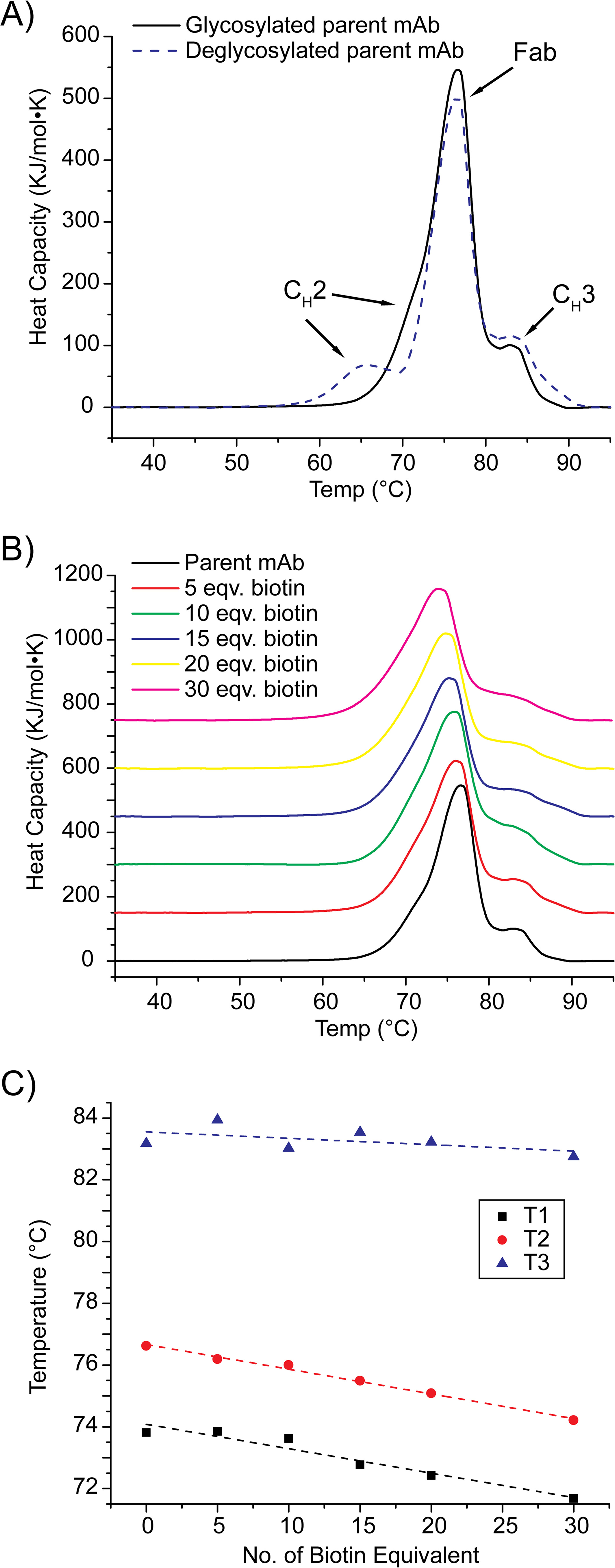DSC Chemical Analysis Service
- Biopharmaceutical Industry: Evaluating protein stability, optimizing drug formulations, and ensuring batch-to-batch consistency of biologics.
- Drug Discovery and Development: Analyzing protein-ligand interactions and identifying stable drug candidates.
- Protein Engineering: Investigating protein folding and unfolding dynamics to enhance structural stability.
- Agriculture: Assessing the stability of plant proteins, seeds, and agricultural bio-products under varying temperature conditions.
- Food Industry: Characterizing the thermal behavior of food proteins, emulsifiers, and additives to optimize processing and storage conditions.
DSC chemical analysis (Differential Scanning Calorimetry) is an advanced thermal analysis technique used to study the heat flow associated with temperature-induced changes in materials. A key focus of DSC chemical analysis is the evaluation of thermal stability which refers to a substance's ability to resist irreversible changes, such as decomposition or structural disruption, under high temperatures. For proteins, especially those sensitive to heat, elevated temperatures can destabilize their tertiary and quaternary structures, leading to unfolding and loss of function. DSC chemical analysis can provide key parameters such as denaturation temperature (Tm), enthalpy (ΔH), and heat capacity (Cp), enabling a deeper understanding of the stability and structural integrity of protein-based products.
In the field of protein research and biopharmaceutical development, DSC chemical analysis is an indispensable tool. DSC chemical analysis enables researchers to evaluate protein thermal stability, analyze folding and unfolding dynamics, and study drug-protein or ligand-protein interactions. These capabilities are particularly crucial for optimizing biologics, such as monoclonal antibodies, vaccines, and therapeutic enzymes, where stability and formulation are key factors for efficacy and quality assurance. By delivering precise thermodynamic insights, DSC plays a vital role in both fundamental research and applied biopharmaceutical innovation.
Service at MtoZ Biolabs
MtoZ Biolabs offers a comprehensive DSC Chemical Analysis Service tailored to meet the diverse needs of protein research and biopharmaceutical development. Our DSC Chemical Analysis Service provides precise and reproducible thermal analysis to support various applications, using advanced Differential Scanning Calorimetry platforms and expert-driven workflows.
The key capabilities of DSC Chemical Analysis Service include identifying and selecting the most stable proteins or potential drug candidates during biotherapeutic development, studying ligand interactions, and quickly optimizing purification and production conditions. Additionally, we enable researchers to establish optimal conditions for liquid formulations efficiently and provide rapid stability indications for target proteins during screening. With our comprehensive DSC solutions, researchers gain critical insights into protein behavior, ensuring the successful development of stable, effective, and high-quality biologics for therapeutic use.
Service Advantages
1. Advanced Instrumentation and High-Resolution Analysis
We utilize state-of-the-art DSC Chemical Analysis Service platforms with high-resolution detection capabilities, allowing us to capture subtle thermal transitions and protein unfolding events.
2. Customized Experimental Design and Flexible Protocols
Our team offers tailored experimental protocols designed to meet specific research goals. From optimizing buffer conditions to accommodating unique sample requirements, we ensure each experiment is customized for maximum data relevance and reliability.
3. Rapid Turnaround Time and Responsive Support
We understand the importance of timely results in research and development projects. MtoZ Biolabs is committed to delivering fast turnaround times without compromising data quality, paired with responsive technical support throughout the process.
Applications
MtoZ Biolabs' DSC Chemical Analysis Service delivers precise thermal analysis across multiple industries. Its applications span diverse fields, including:
Case Study
Evaluating the Thermal Stability of Biotinylated Monoclonal Antibodies Using DSC Chemical Analysis Service
In this study, DSC chemical analysis was employed to assess the thermal stability of biotinylated monoclonal antibodies (mAbs) in both glycosylated and deglycosylated states. DSC thermograms revealed a significant decrease in the CH2 domain transition temperature upon deglycosylation, indicating structural destabilization. Additionally, increasing biotin conjugation levels led to a linear decrease in the Fab domain melting temperature, with notable destabilization observed after more than 15 biotin equivalents. This study demonstrates the sensitivity and precision of DSC Chemical Analysis Service in detecting subtle thermal stability changes caused by glycosylation status and biotinylation, providing critical insights for optimizing antibody-drug conjugate (ADC) stability in therapeutic development.

FAQ
Q: How do parameters like Tm, ΔH, and Cp collectively contribute to a comprehensive understanding of protein stability and behavior in varying conditions?
Parameters like Tm, ΔH, and Cp, measured through DSC Chemical Analysis Service, provide a holistic view of protein stability and behavior. Tm (denaturation temperature) indicates the temperature at which a protein unfolds, reflecting its thermal stability. ΔH (enthalpy) measures the energy required for denaturation, revealing the strength of intramolecular interactions. Cp (heat capacity) highlights changes in protein structure during thermal transitions, offering insights into folding/unfolding dynamics. Together, these parameters allow researchers to evaluate a protein’s resilience under stress, optimize formulation conditions, and ensure stability for therapeutic applications, providing a comprehensive understanding of its structural and functional integrity.
Deliverables
1. Comprehensive Experimental Details
2. Materials, Instruments, and Methods
3. Raw Data Files
4. Thermal Stability Analysis Results
How to order?







